Reviews
• The Twilight Saga: New Moon
• An Education
• The Blind Side
• Precious: Based on the Novel Push by Sapphire
The Twilight Saga: New Moon (Summit)
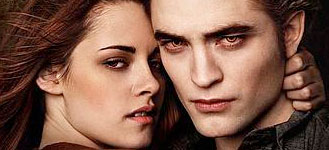
The Stab: A satisfying second chapter to the Twilight saga, improving on its predecessor in every way possible. Even with a scant narrative, the film gushes with dark romance and flights of fancy.
New Moon brings a new beginning and a major upgrade to the Twilight franchise. Director Chris Weitz fills in the critical cracks of the first film created at the clumsy hands of Catherine Hardwicke.
The first entry’s restricted perspective and seasick framing are replaced by expansive lensing and an epic scope. Effects are sharper, clearer, and more convincing. Instead of cheesy baseball montages, we get chiseled boys transforming into massive wolves.
The writing is more rhythmic and intuitive, expunging the improvised ramblings of the first installment. The actors also prove more proficient. Kristen Stewart even imparts some woeful beauty in her misery. She still twitches and babbles like an over-caffeinated idiot—only so much less of the time.
The entire presentation feels clean, professional, and polished, whereas Hardwicke’s vision exuded amateurism. New Moon might be made of less distinctive, independent grit, but I’ll take slick over sloppy any day.
The plot marches forward at a steady pace, shrouded in a tempting mystical intrigue—even if New Moon has very little story to tell. Bella and Edward are together. Bella and Edward are apart. Bella is sad. Bella meets Jacob. Edward is sad. Bella saves Edward. Bella and Edward are together again. (Jacob is sad.)
The film is rarely boring, but it feels aimless and inconsequential. The fantasy isn’t very well thought out, either; I more than once found myself uselessly trying to fill plot holes.
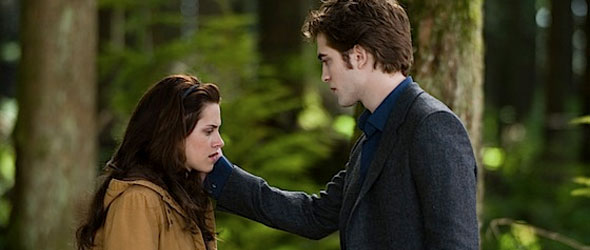
But New Moon works best, even quite well, as a dark and brooding Gothic romance between the restless Bella and her vampire defender Edward. Bella and Edward are the Catherine and Heathcliff of the Kindle generation, their souls interweaving atop the “wuthering heights” of Forks, Washington.
Their love is so thick and heavy that it’s painful to them. When they embrace, their hearts implode. They wince and cry out in agony.
…or is it ecstasy? New Moon seems to acknowledge and amplify its strong sexual undercurrents far more readily than its predecessor. When Bella and Edward kiss, their lips are not locking: they are lusting—lunging and grinding together to the tempo of intercourse. Teetering on sex’s edge bolsters desire in this tantalizing, pseudo-chaste romantic pairing.
It’s a shame then that our focal lovers are kept apart through most of the film. Separation intensifies the achy heart behind their passion, but Bella’s agony grows terribly weary. She seldom moves for months on end. She screams as if tortured in the throes of her dreams.
Her friends become impatient—as humorously portrayed by the wonderful Anna Kendrick, my crush of the moment and set for superstardom when the fantastic Up in the Air is released next month. We become just as impatient. Somebody get this girl some Prozac already!
Bella does begin to mingle with her friend Jacob, a longtime local and incidental werewolf (boys in Forks are so complicated, aren’t they?). He’s charming, warm, and loyal, not unlike man’s best friend should be, but his connection to Bella cannot generate the same romantic intensity.
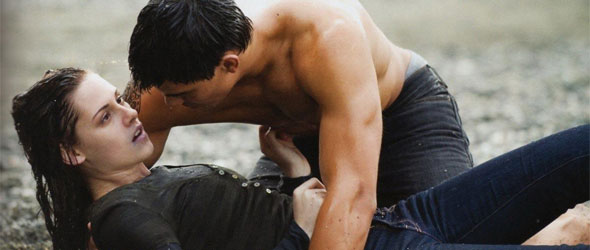
Once Bella and Edward are reunited, the film has even less to say—but it digs its heels in just the same, dragging like a felled tree trunk through the forest toward its expectedly open-ended conclusion. Twilight fans will have to wait until the summer for their next vampiric abstinence fantasy fix.
But I’m left to wonder: why all the trouble over someone like Bella? She’s temperamental, depressing, and dreary. Even Edward is nothing to write home about. He may have been unfailing in the first film, but here he’s distant, reckless, and crabby—not to mention the pale and scaly skin.
Poor Jacob wants Bella for himself, but I say Bella and Edward deserve each other. If Edward turns Bella into a vampire as she desires, they can wallow together in angsty eternity. Wolf-boy is better off burying his bone in someone else’s yard. • B- (Rated PG-13 • 130 minutes)
Tickets & Showtimes» Watch the Trailer» Visit the Website»
An Education (Sony Classics) *Adam’s Weekend Pick*
The Stab: A scrumptious, ebullient film that echoes with ingenuity, led by the exquisite Carey Mulligan in a dazzling performance.
This week, we have the opportunity to witness an awesome cosmic phenomenon. I’m not referring to the grander-than-usual Leonid Meteor Shower, either—but the birth of a star. Her name is Carey Mulligan, and you can view her interstellar emergence in ravishing clarity—no need for telescopes or pre-dawn treks to the countryside—in the delightful film An Education.
A coup of simple storytelling, An Education explores familiar territories with a keen point of view and a sharp polish. Lone Scherfig’s delectable direction and an effervescent screenplay by Nick Hornby breathe new life into the tired concept of teenage angst and self-discovery.
The teen in this instance is Carey Mulligan’s Jenny, a schoolgirl in the sixties caught between sturdy societal expectations and her own wishes to explore the boundless potentials of life. She catches a lucky break when David, a smooth-talking thirtysomething, offers her a ride home in the rain, out of expressed consideration for her cello.
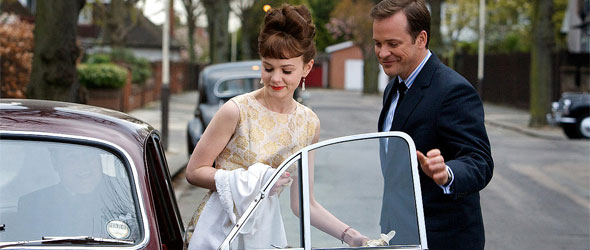
David introduces Jenny to a vibrant world of art, music, soirees, and champagne. He seems to be everything Jenny has ever wanted. He isn’t. David doesn’t offer a generous hand; he takes advantage of an impressionable young girl.
Jenny feels anxiously alone. She’s stuck in social limbo: too clever to relate to her peers, too eager to stick by the mores at school and home, too young to meaningfully contribute to the world, and too poor to partake in the amusements of high society. On David’s wing, Jenny gains access to restricted grounds, joining in on the diversions of the upper crust and, above all else, finding a place to comfortably plant her feet.
David sells well a shiny veneer, but underneath he’s lecherous and dishonest. In his performance, Peter Sarsgaard never forgets that David is little more than a pedophilic predator. A tempered treachery lurks behind his hazy gaze. It’s not until his first attempted sexual encounter with Jenny that his sleaze outwardly begins to show, but Jenny is too dizzy from the whirls of romance to notice.
Though she may be on the brink of seventeen, it’s hardly a stretch that David would fall for Jenny. For me, it was love at first sight. Jenny is irresistible, and Mulligan radiates sunshine as she plays her to perfection. She is consistently in-step with the wills and wistful psyche of her character. She exhibits an effortless control, performing to the smallest subtleties—every glance, every gesture—while never once seeming short of completely inspired. It’s a career-best caliber performance in a career that has only just begun (and one that will, I have little doubt, thrive for years and years to come).
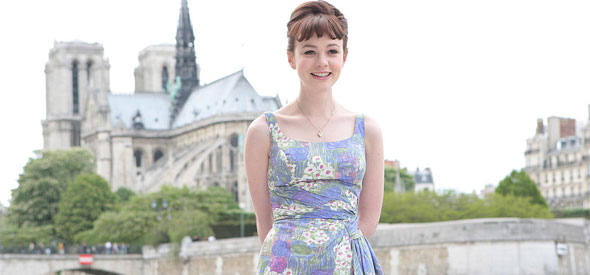
There truly is not a weak link in the cast. Rosamund Pike offers a witty and sophisticated spin on the “dumb blonde” as one of David’s friends. Alfred Molina shows great skill as he roots the tetchiness of Jenny’s cranky, narrow-minded father in misplaced fears. Emma Thompson is also strong as Jenny’s smugly certain principal.
So what of an education, then? Characters are firmly fixed on either side of the argument: parentals and professionals insist that school brings success, while David and his clan prefer a good time to becoming a cog in the combine. We explore each perspective along with Jenny, and, as with most things, balance seems to be the solution.
But the film quite surprisingly does not heed its own wisdom. The narrative takes a definite stance as it hurries toward a tidy conclusion, tripping over itself along the way. Only Jenny’s English teacher Miss Stubbs, thoughtfully played by Olivia Williams, acknowledges the lack of a clear-cut answer as she sees within Jenny her own aptitude, and also her own unfulfilled desires.
Miss Stubbs’ revelations are forgotten, however, in the flurry toward the finale. It’s a disappointing turn: the film is able to supersede the constraints of its own genre trappings until this final act.
Alas, it’s a slight imperfection against a delicate and beautiful work—a crack at the base of a gleaming marble statue. Despite a less-than-thrilling destination, An Education is well worth the journey. Watching Carey Mulligan alone justifies the ticket price. Add in the entirety of this rich and wonderful film, and the tuition payment is a steal. • A- (Rated PG-13 • 95 minutes)
Tickets & Showtimes» Watch the Trailer» Visit the Website»
The Blind Side (Warner Bros.)
The Stab: An entertaining though shallow feel-good holiday sports triumph film. Breezes over hard strokes in favor of simple storytelling devices, fumbling a grand opportunity for poignant social commentary.
“Based on the extraordinary true story,” heralds the poster for The Blind Side. The story belongs to current Baltimore Ravens offensive tackle Michael Oher, and terming his saga extraordinary is indeed appropriate.
Born into poverty, his mother a drug addict and his father out of the picture, Oher spent most of his young life lateraled between different schools and foster homes. He slipped through the cracks of the educational system to become virtually illiterate at a high-school age.
His life dramatically changed when the gracious upper-middle-class Touhy family took him in as one of their own. They nurtured him, gave him a home, and even saw that he would succeed academically. It’s no surprise that the six-foot-four, 300 pound-or-thereabouts teen also became a prized player on his school’s football team. With the support of his new family, Oher went on to play for Ole Miss before making his debut in the NFL this year.
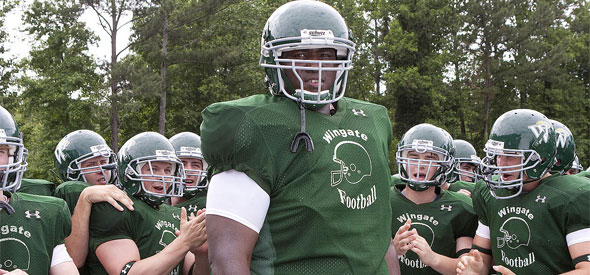
Oher’s accomplishments had barely cooled when production for this film began; principal photography started five months before Oher’s first NFL appearance. I wouldn’t say the finished product is rushed, but it isn’t particularly thoughtful either.
The film takes the forces in Michael Oher’s life, both positive and negative, and reduces them all to a lowest common denominator. Issues are so simplified that they are see-through. Characters are paper dolls. Any of humanity’s sharp edges are buffed and blunted. Most opportunity for genuine social commentary or character study is lost.
In The Blind Side, the world is black and white—figuratively, but also literally. Superficial portraits can’t help but seem racist, especially when immersed in an equally shallow context.
The gaps created by excisions of substance are filled with cheesy, crowd-pleasing diversion devices: close-up smiley reaction shots, pillow-soft “practice makes perfect” montages, and self-assured yelps from the adorably young S.J. Touhy. Don’t get me wrong: it’s all a hoot-and-a-half (if not one or two montages too many). But it’s also tirelessly, and tiresomely, dim-witted.
I was told that Michael Oher did not approve of how he was portrayed in the film—and I don’t blame him. The filmmakers want Oher to be lovable. They succeed, but he’s lovable in the way a three-legged puppy dying of leukemia is lovable. Quinton Aaron plays Michael Oher as pitiful, helpless, and hopeless without the guiding light of his teachers and the Touhys. Through most of the film, Oher is hardly even a character, just a chunk of clay molded by the helping hands around him. He is eventually given a chance to speak, yielding the movie’s most honest and moving scene, but surely there was more Michael Oher had to say.

Sandra Bullock headlines as Michael’s tough-as-nails adoptive mother Leigh Anne Touhy. The film is as much about her transformation as it is about Michael’s. But Bullock isn’t quite committed enough to sell Leigh Anne’s unsinkable fortitude. She passes just fine on spunk, but her face lacks convincing expression. (Blame it on the Botox?) Some are calling this her revelatory performance. I much prefer her work in Paul Haggis’ 2004 ensemble drama Crash.
In the end, The Blind Side is not a movie that celebrates the triumphs of Michael Oher. It’s a feel-good sports flick that uses the outlines of Oher’s story for manufactured intensity. The film bypasses anything too shocking or offensive, leaving in just enough social struggle to let middle-class moviegoers pat themselves on the back for feeling culturally aware.
Maybe I’m being too cynical. The film is entertaining and has a few truly inspired moments. Beneath its often shallow exterior, there’s a big, warm heart—even if it beats at a preset pace. But don’t be fooled: while The Blind Side is based on an “extraordinary” true story, the film is more just extra-ordinary. • C+ (Rated PG-13 • 128 minutes)
Tickets & Showtimes» Watch the Trailer» Visit the Website»
Precious: Based on the Novel Push by Sapphire (Lionsgate)
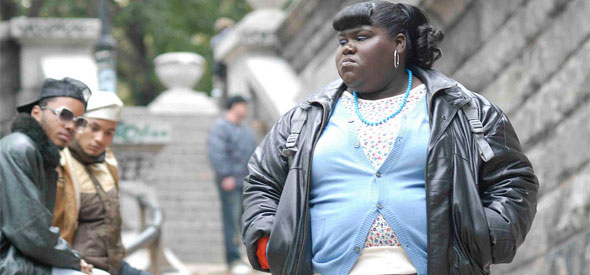
The Stab: A heartbreaking and brutally honest film. Mo’Nique and newcomer Gabby Sidibe give incredible performances in this vibrant portrait of hope and survival amid humanity’s despair.
Oh what a precious film indeed! This staggering work plows forward with the force of a bullet train, its shockwaves singing the deepest corners of the soul.
Precious tells the story of one remarkable girl, a Claireece “Precious” Jones, struggling to put one foot in front of the other. She’s drowning in her own social circumstances: overweight, poor, illiterate, and lonely, awash in the acerbity of the Harlem projects.
But it is her tyrannical and unforgiving mother that keeps her clamped beneath onerous waters. Mo’Nique more than proves her acting prowess as Precious’ mother Mary. She inhabits a terrifyingly unpredictable and unrestrained intensity, crafting a villain, a monster, a despicable demon in human form.
If Christoph Waltz of Quentin Tarantino’s Inglourious Basterds plays a Hannibal Lechter for the new millennium, then Mo’Nique’s Mary is the perfect Buffalo Bill. It’s unnerving to see her heedlessly dancing to the tunes on TV, petting the edges of her short, styled wig, lost in delusions of self-importance—just as Buffalo Bill prepped his skin-suit and posed before the camera in his labyrinthine basement.
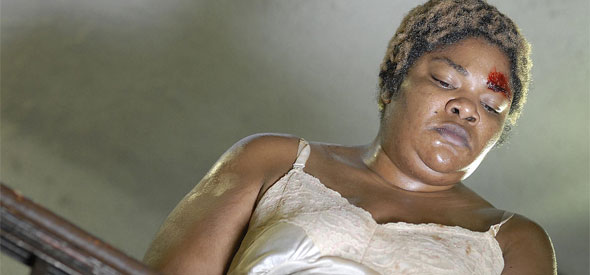
To escape the constant stream of abuse from her mother, Precious fantasizes a heartbreaking alternate reality, one in which she isn’t squandered by the scum of the Earth. She sees herself as a model, as a movie star, with a loving family and a handsome boyfriend.
If these digressions are humorous at first, they are just as soon devastating. Precious combs her hair in front of a mirror, and staring back at her is a different girl: thin, pretty, happy, and white. Director Lee Daniels takes a big risk in the way he folds Precious’ fantasies into her reality, but the emotional pay-off is just as big. It burns to see Precious abused, but sharing in her beautifully faultless imagination pours mounds of salt into the wound.
Precious gets a chance to rise above her abysmal existence when she attends an alternative school, a reparative program for those failed by the established educational system. There are no quick fixes, and progress is slow. It takes tremendous patience and determination for Precious to advance the smallest distance.
Miss Rain, in a sturdy and perceptive portrayal by Paula Patton, becomes more than a teacher to Precious: she becomes a godsend. Precious is submerged in horror, but Miss Rain is committed to making a difference. She is willing to offer whatever time and energy it takes.
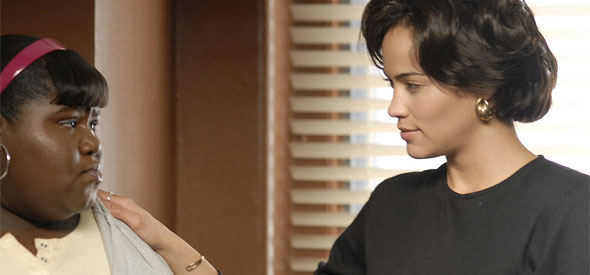
When Miss Rain asks how she feels during moments of small victory, Precious responds with excruciating honesty. “Here,” she says. “Warm,” she says. Feelings so simple, so basic, and yet so special to Precious. How tremendously unfair that these are not comforts she too can take for granted.
Gabby Sidibe plays Precious with superb restraint and painful authenticity. She wears Precious’ burdens like a leaden backpack, but she never collapses under its weight or spirals into histrionics. When Precious does reach her breaking point, Sidibe displays astoundingly raw emotional power. “I’m tired!” she cries. I was winded just from watching. The moment is an incredible catharsis.
Indeed, the film masterfully portrays how tiring and difficult these issues really are. There are no easy answers; the fell swoop of some legislator’s pen will do little, if anything for Precious. It takes immense consideration and understanding to gain any ground.
And it takes love. Precious is ultimately a testament to the power and importance of love. Viewed through an ignorant lens, Precious might seem unattractive in her girth, repelling in her demeanor, pitiful in her condition. But beneath all that was devastated by life’s torrential forces, Precious has a vibrant, beating heart. She has so much love to give and such a beautiful soul to share. And love—from those who have the courage to weigh her worth—is her only life raft. • A (Rated R • 110 minutes)
Tickets & Showtimes» Watch the Trailer» Visit the Website»




Leave a Reply
You must be logged in to post a comment.